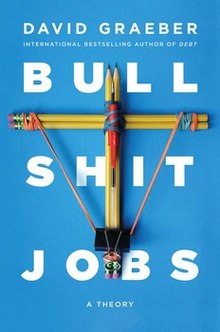
UBI – Universal Basic Income
I finished reading Bullshit Job: A Theory recently, but this post is less about the whole book but rather it’s conclusion.
That is, Universal Basic Income might solve the problem where between 30-40% of us secretly believe our jobs probably aren’t necessary.
Before reading this book, my relative unsubstantiated opinion was that UBI is a bad idea, but since then I’ve changed my opinion to that “it sounds good in THEORY”.
Definition
It might be worth defining UBI first, which is:
…a model for providing all citizens of a country or other geographic area with a given sum of money, regardless of their income, resources or employment status. The purpose of the UBI is to prevent or reduce poverty and increase equality among citizens.
See here
Here a few interesting points:
- UBI reduces the role of the government – essentially eliminating large government areas such as Medicare and other Social Security Departments
- Smaller governments benefit their citizens because:
- Government Spending vs Private Sector Spending is a zero sum game. The government can only spend what is taken away from private sector (via taxes).
- Private spending is more efficient than government spending
- UBI is functional only if the there is large enough offset of tax dollars are redirected from government spending
- It is worth thinking about the current system and comparing the number of people who get social security payments undeservingly vs those who miss out i.e. type I error vs type II error
- It empowers employees to leave jobs that are not perceived as meaningful i.e. ‘Bullshit jobs’. This allows the supply side of the employment market to become less restricted and reducing the exploitation of labour.
- This in turns allows people to spend more time doing what they enjoy, especially in the arts and innovation that may not have a short term economic return i.e. the decoupling of livelihood from work.
- It keeps employers in check, preventing the ‘Bullshitisation’ of jobs e.g. academic staff bogged down in administrative duties instead of teaching / doing research
Back of the Napkin Calculations
So how would this play out in Australia on a very rudimentary level? I’ve done some extremely rough calculations:
- In 2018, a little over $250 billion dollars was spent in payment redistribution (Health + Social Security + Welfare) – See here
- Australia’s population is approx 24 million
- Therefore if this money was replaced with UBI, each person will get a little over $10,400
- Australian minimum wage is around $700 a week, which equates to $36,400
- So right now there is a discrepancy of $26,000
However, if you look more closely at the budget there are many other areas of government spending that would have a questionable existence under UBI such as:
- Education
- Housing
- Agriculture, forestry and fishing
Furthermore, if everyone’s livelihood is secure it wouldn’t be a stretch for the “cost of living” to go down (e.g. rent), reducing the minimum wage requirements.
Would this mean UBI meet minimum wage in Australia as it stands? It’s hard to say, but right now I’m leaning towards no. But I’m optimistic that it is possible.